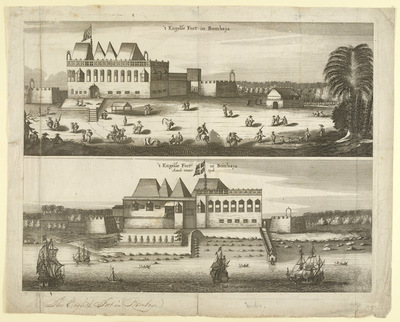Javascript must be enabled to continue!
't Engelse Fort in Bombaja. 't Engelse Fort in Bombaja aande water zyde
View through Europeana Collections
Engraving by an anonymous artist of the Fort at
Bombay in Maharashtra, dated between 1700 and 1750. The print is
captioned 't Engelse Fort in Bombaja; 't Engelse Fort in Bombaja
aande water zyde.'; and is inscribed in ink: 'The English Fort in
Bombay'.The area of Bombay was controlled by the Portuguese from
1534 until 1661, when it was ceded to the English as part of the
marriage dowry Catherine of Braganza. In 1668, the directors of the
English East India ordered the construction of a custom house,
warehouse and quay around the Portuguese settlement on Bombay
Island. In the 1670s, under the governorship of Gerald Aungier,
Bombay was developed as a trading centre. In 1716, his plans for a
walled town with bastions were implemented by a later governor,
Charles Boone. By 1710, the fort included a magazine, quarters for
soldiers and two water tanks. This engraving shows two views of the
fort, one from the landward side and the other from the
harbour.
Title: 't Engelse Fort in Bombaja. 't Engelse Fort in Bombaja aande
water zyde
Description:
Engraving by an anonymous artist of the Fort at
Bombay in Maharashtra, dated between 1700 and 1750.
The print is
captioned 't Engelse Fort in Bombaja; 't Engelse Fort in Bombaja
aande water zyde.
'; and is inscribed in ink: 'The English Fort in
Bombay'.
The area of Bombay was controlled by the Portuguese from
1534 until 1661, when it was ceded to the English as part of the
marriage dowry Catherine of Braganza.
In 1668, the directors of the
English East India ordered the construction of a custom house,
warehouse and quay around the Portuguese settlement on Bombay
Island.
In the 1670s, under the governorship of Gerald Aungier,
Bombay was developed as a trading centre.
In 1716, his plans for a
walled town with bastions were implemented by a later governor,
Charles Boone.
By 1710, the fort included a magazine, quarters for
soldiers and two water tanks.
This engraving shows two views of the
fort, one from the landward side and the other from the
harbour.
Related Results
Pond with Water Lilies
Pond with Water Lilies
From his earliest years as a painter, Monet’s art was rooted in the direct and prolonged analysis of nature. Throughout his career, he grappled with the task of developing techniqu...
Bari Khwabgah behind the Diwan-i-Am, Lahore
Bari Khwabgah behind the Diwan-i-Am, Lahore
Watercolour drawing of the Bari Khwabgah in
Lahore, by an anonymous artist working in the Punjab style, c.1860.
Inscribed in Persian characters is: 'Makan i darbar ya'ni khwabgah
i...
Pleated paper fan, painted on the front in water-colours with a racing scene, sticks and guards of tortoiseshell, Great Britain, late 18th century. Pleated paper fan, painted on the front in water-colours with a racing scene, showing jockeys on horseback
Pleated paper fan, painted on the front in water-colours with a racing scene, sticks and guards of tortoiseshell, Great Britain, late 18th century. Pleated paper fan, painted on the front in water-colours with a racing scene, showing jockeys on horseback
Pleated paper fan, painted on the front in water-colours with a racing scene, sticks and guards of tortoiseshell, Great Britain, late 18th century. Pleated paper fan, painted on th...
'Water Palace - Chitore. India. Decr. 1878'
'Water Palace - Chitore. India. Decr. 1878'
Oil painting of Padmini's Palace in Chittaurgarh,
Rajasthan by Marianne North, dated December 1878.Initially Marianne
North (1830-1890) only painted botanical specimens and travell...
f.11 Wild buffalo
f.11 Wild buffalo
Water-colour drawing by John Johnson of a water
buffalo taken from a sketch-book of 36 drawings (36 folios)
depicting scenes chiefly in W. India and Mysore, dated
c.1795-1801.The w...
Water and Oil Drawing
Water and Oil Drawing
Water and Oil Drawings, 1996, a series of four silver gelatin prints, Herrera takes two diametrically opposed substances and documents their inter/re-action. His experiments yield ...
Water and Oil Drawing
Water and Oil Drawing
Water and Oil Drawings, 1996, a series of four silver gelatin prints, Herrera takes two diametrically opposed substances and documents their inter/re-action. His experiments yield ...




